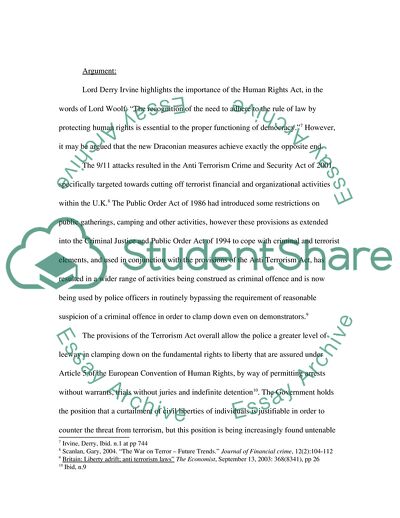
- Home
- Free Samples
- Premium Essays
- Editing Services
- Extra Tools
- Essay Writing Help
- About Us
- Studentshare
- Subjects
- Miscellaneous
- Law in a dynamic world
Law in a dynamic world - Essay Example

- Subject: Miscellaneous
- Type: Essay
- Level: Undergraduate
- Pages: 4 (1000 words)
- Downloads: 0
- Author: una87
Extract of sample "Law in a dynamic world"
The past two decades have brought forth harsher legislation5 to deal with the problems of terrorism and deteriorating law and order, which seriously question former Prime Minister John Major’s contention that “we have no need of a Bill of Rights because we have freedom.”6 As Daley points out, the question that arises now is –to what extent can the law limit the freedoms of individuals in the interest of justice, fairness and equity in view of the inherent dangers this poses within a democratic society?
7 Lord Derry Irvine highlights the importance of the Human Rights Act, in the words of Lord Woolf: “The recognition of the need to adhere to the rule of law by protecting human rights is essential to the proper functioning of democracy.”7 However, it may be argued that the new Draconian measures achieve exactly the opposite end. The 9/11 attacks resulted in the Anti Terrorism Crime and Security Act of 2001, specifically targeted towards cutting off terrorist financial and organizational activities within the U.K.8 The Public Order Act of 1986 had introduced some restrictions on public gatherings, camping and other activities, however these provisions as extended into the Criminal Justice and Public Order Act of 1994 to cope with criminal and terrorist elements, and used in conjunction with the provisions of the Anti Terrorism Act, has resulted in a wider range of activities being construed as criminal offence and is now being used by police officers in routinely bypassing the requirement of reasonable suspicion of a criminal offence in order to clamp down even on demonstrators.
9 The provisions of the Terrorism Act overall allow the police a greater level of leeway in clamping down on the fundamental rights to liberty that are assured under Article 5 of the European Convention of Human Rights, by way of permitting arrests without warrants, trials without
...Download file to see next pages Read More
- TERMS & CONDITIONS
- PRIVACY POLICY
- COOKIES POLICY